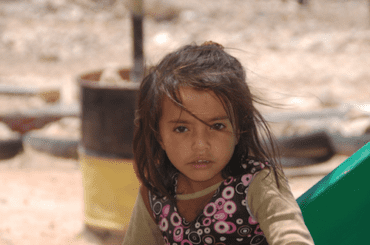
Jesus spent three years with his disciples, ministering to people, healing the sick, spending time in fellowship with sinners, and preaching the good news. In the last two weeks before his death and resurrection, he showed us where his priorities were. Jesus knew what awaited him in Jerusalem, even predicting his death to his disciples (Matt. 20, Mark 10, Luke 18). No doubt, he felt the weight of what was to come. Yet, as his darkest hour approached, he did not spend his time worrying, but rather he elevated the least of these. Jesus carved out time to bless children, proclaiming the kingdom of God belongs to them (Mark 10:13-16).
Many people on all sides of the Palestinian/Israeli conflict feel as though they are in an endless period of waiting for peace. Sometimes, it seems there is no end in sight. Often, children are the ones who experience the greatest burdens of conflict. Deborah Ellis, Canadian activist, and author, compiled a book of interviews with Israeli and Palestinian children, titled Three Wishes: Palestinian and Israeli Children Speak. It showcases the emotions of fear, confusion, anger, and hope felt by children on all sides of the conflict, as they long for an end. Gul, an Israeli boy, states, “All I know about this war is that it’s about this country, this land. The Palestinians want it, and we want it, so we’re fighting over it. I don’t know how it will end, or if it ever will.” Maryam, a Palestinian girl, expresses a similar longing for an end to the conflict, “I have only one wish. I would like to go to heaven. Maybe in heaven there is happiness, after we die. Maybe then.”
I have only one wish. I would like to go to heaven. Maybe in heaven there is happiness, after we die. Maybe then.
Expressed in these statements are emotions felt by many Palestinian and Israeli children. Each of them has been taught something about who they are, why they are in conflict, and what it will take for the conflict to end. Each of them longs for the peace and joy its end would bring. For these children, normal life consists of bomb threats, the fear of losing parents, and the threat of being put in detention centers. Yanal, a young Palestinian refugee interviewed for Ellis’ book, reminds us, “Being religious, whether you are Muslim or Christian or Jewish, or whatever you are, means that you should help people, and make the world better, and not just think of yourself. We have these things in common, at least in our religions.”
So, how can we learn from Jesus’ example and elevate these children who truly are “the least of these?” First, we create space for them in our lives. Jesus was indignant at his disciples and brought the children close, despite the disciples’ attempt to keep them from him. Then, we speak words of value and identity into their lives. Jesus elevated these children by speaking words of affirmation over them, even stating that others should become like them if they want to enter his kingdom. For us, this may mean advocating on the behalf of these children to our government, supporting organizations that love them well, or even taking a trip to the land to see their faces and hear their stories firsthand. Regardless of what each of us is specifically called to and able to do, we are all called to actively wait alongside these precious children for peace to come.
Dear God,
Be with the children in the Holy Land who experience daily confusion, pain, anger, frustration and hope, as they wait for an end to this conflict. Comfort them, hold them close, and bless them. Teach us what it means to actively support these children. As we near the end of the Lenten season and we wait for the joy of Easter morning, let us continue to be active in pursuing justice and mercy.
In your Holy Name we pray,
Amen.
Molly Lorden is the Church Engagement & Millennial Voices for Peace Intern at Churches for Middle East Peace, and is studying toward a Masters in Divinity from Princeton Theological Seminary. She writes for Prayers for the Holy Land, where this article first appeared.



One Response
Beautiful reminder of why we are here and what we have been called to do. Yanal, who is wise beyond his years, is a great example of a little child leading us. How precious and unifying – a child who can see common ground in multiple faith-walks suggesting that we come together on that common ground v going to war. Thank you Molly!